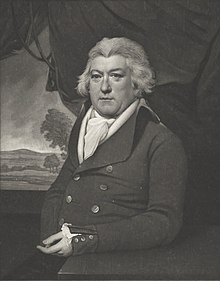
William Mitchell (1742ŌĆō1823) was a British planter, attorney and official in Jamaica, where he was known as "King Mitchell" for his many interests in plantations. He was also a Member of Parliament at Westminster, and West India Interest activist. [1]
Life
He was the eldest son of John Mitchell of Doune, Perthshire and his wife Margaret Ferguson. [2]
Mitchell was elected one of the Members of Parliament for Plympton Erle in 1796, supported by Paul Treby Treby. [3]
While the position of Receiver General of Jamaica was held in name at the time by Viscount Sackville, the post was leased. William Mitchell's brother James died as the lease-holder. William Mitchell went to Jamaica in 1798, and it is presumed the reason was to take up the lease on the lucrative office. [1] He filled his brother's seat in the Jamaican assembly in 1798; and resigned as a Westminster MP in 1799, his place there being taken in a by-election by Richard Hankey. He renewed the lease in 1808 with Lord George Sackville-Germain, younger brother of the previous holder, to whom the title had passed. [3] [2] [1]
Mitchell gave evidence to a parliamentary committee in 1807. [4] By the 1820s, he no longer lived in Jamaica. [5]
Family
Mitchell and his wife Catherine Hamilton had a daughter but no sons. He left his Jamaican and Scottish property to John Mitchell, one of the five sons of his brother David, a London merchant in business with Robert Milligan. [1] [6] [7]
Notes
- ^ a b c d "William 'King' Mitchell, 1742ŌĆō1823, Legacies of British Slavery". www.ucl.ac.uk.
- ^ a b "Mitchell, William (?1742-1823), of Upper Harley Street, Mdx. and Spanish Town, Jamaica, History of Parliament Online". www.historyofparliamentonline.org.
- ^ a b "Plympton Erle (1790-1820), History of Parliament Online". www.historyofparliamentonline.org.
- ^ Commons, Great Britain Parliament House of (1808). Reports from Committees. p. 254.
- ^ Petley, Christer (6 October 2015). Slaveholders in Jamaica: Colonial Society and Culture during the Era of Abolition. Routledge. p. 32. ISBN 978-1-317-31393-9.
- ^ "Francis Henry Mitchell 1795-1891, Legacies of British Slavery". www.ucl.ac.uk.
- ^ "Robert Milligan 1746 - 21st May 1809, Legacies of British Slavery". www.ucl.ac.uk.

William Mitchell (1742ŌĆō1823) was a British planter, attorney and official in Jamaica, where he was known as "King Mitchell" for his many interests in plantations. He was also a Member of Parliament at Westminster, and West India Interest activist. [1]
Life
He was the eldest son of John Mitchell of Doune, Perthshire and his wife Margaret Ferguson. [2]
Mitchell was elected one of the Members of Parliament for Plympton Erle in 1796, supported by Paul Treby Treby. [3]
While the position of Receiver General of Jamaica was held in name at the time by Viscount Sackville, the post was leased. William Mitchell's brother James died as the lease-holder. William Mitchell went to Jamaica in 1798, and it is presumed the reason was to take up the lease on the lucrative office. [1] He filled his brother's seat in the Jamaican assembly in 1798; and resigned as a Westminster MP in 1799, his place there being taken in a by-election by Richard Hankey. He renewed the lease in 1808 with Lord George Sackville-Germain, younger brother of the previous holder, to whom the title had passed. [3] [2] [1]
Mitchell gave evidence to a parliamentary committee in 1807. [4] By the 1820s, he no longer lived in Jamaica. [5]
Family
Mitchell and his wife Catherine Hamilton had a daughter but no sons. He left his Jamaican and Scottish property to John Mitchell, one of the five sons of his brother David, a London merchant in business with Robert Milligan. [1] [6] [7]
Notes
- ^ a b c d "William 'King' Mitchell, 1742ŌĆō1823, Legacies of British Slavery". www.ucl.ac.uk.
- ^ a b "Mitchell, William (?1742-1823), of Upper Harley Street, Mdx. and Spanish Town, Jamaica, History of Parliament Online". www.historyofparliamentonline.org.
- ^ a b "Plympton Erle (1790-1820), History of Parliament Online". www.historyofparliamentonline.org.
- ^ Commons, Great Britain Parliament House of (1808). Reports from Committees. p. 254.
- ^ Petley, Christer (6 October 2015). Slaveholders in Jamaica: Colonial Society and Culture during the Era of Abolition. Routledge. p. 32. ISBN 978-1-317-31393-9.
- ^ "Francis Henry Mitchell 1795-1891, Legacies of British Slavery". www.ucl.ac.uk.
- ^ "Robert Milligan 1746 - 21st May 1809, Legacies of British Slavery". www.ucl.ac.uk.